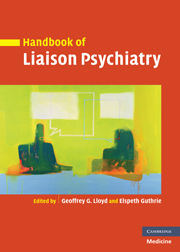Book contents
- Frontmatter
- Contents
- List of contributors
- Preface
- Part I Basic skills
- 1 The development of general hospital psychiatry
- 2 Establishing a service
- 3 Legal and ethical issues in liaison psychiatry
- 4 Understanding psychological reactions to physical illness
- 5 Detection of psychiatric disorders in the general hospital
- 6 The role of the nurse in liaison psychiatry
- Part II Common psychiatric problems across the general hospital
- Part III Working with specific units
- Part IV Treatment
- Part V Different treatment settings
- Index
- References
3 - Legal and ethical issues in liaison psychiatry
from Part I - Basic skills
Published online by Cambridge University Press: 10 December 2009
- Frontmatter
- Contents
- List of contributors
- Preface
- Part I Basic skills
- 1 The development of general hospital psychiatry
- 2 Establishing a service
- 3 Legal and ethical issues in liaison psychiatry
- 4 Understanding psychological reactions to physical illness
- 5 Detection of psychiatric disorders in the general hospital
- 6 The role of the nurse in liaison psychiatry
- Part II Common psychiatric problems across the general hospital
- Part III Working with specific units
- Part IV Treatment
- Part V Different treatment settings
- Index
- References
Summary
Introduction
Liaison psychiatrists are frequently asked to advise when patients refuse consent to medical intervention, especially when possible mental disorder, or other emotional or mental disturbance, may play a part in that refusal. The aim of this chapter is to give practising clinicians a framework for understanding legal issues surrounding refusal of treatment in the general hospital context. This will be achieved by a discussion of the legal position in one jurisdiction with which the author has a working knowledge (England and Wales), followed by a series of cases and commentaries that serve to illustrate the kinds of problems that commonly arise. Readers working in jurisdictions other than England and Wales should seek guidance from their hospital's legal advisers as to how the same issues are dealt with in their country.
The legal position in England and Wales
Statute law
The Mental Health Act 1983 (MHA), allows for the legal detention and treatment of persons with mental disorder where admission for that disorder is considered necessary in the interest of their health or safety, or for the protection of others, and where they are unable or unwilling to consent to such admission. The use of the MHA enables patients to be detained in hospital and to be treated, against their will, for their mental disorder, whereas it does not sanction treatment for physical disorders unconnected to the mental disorder, even where the patient is unable or unwilling to give consent.
- Type
- Chapter
- Information
- Handbook of Liaison Psychiatry , pp. 47 - 63Publisher: Cambridge University PressPrint publication year: 2007

